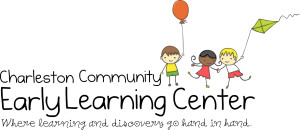Classrooms
Nursery
Activities are planned for each infant based on individual stages of development. Activities range from reading aloud to doing finger plays and basic building with blocks, etc. Conscious verbalizing is carried on at all times. A variety of brightly colored, different shaped blocks, balls, etc. are available for use in the above planned activities and general use. These provide for exploration and introduction to colors, shapes, textures and so on.
Toddlers
In the Toddler room mastering used of own cup (elimination of sipper lid); beginning table manners (“please”, “thank you”, “more please”, use of spoon, encouragement to at least taste foods on plate, etc.); communication through primary verbalization; compliance with simple directions; introduction to potty chair use near end of time in Toddler room, unless earlier interest is shown.
Two’s
For entrance into the Two’s room a child will be eating with utensils; drinking from cup without sipper lid; using simple vocabulary. Skills developed at the two year level: recognition of first name, basic colors, and shapes; ability to put shoes and socks onto feet; toilet trained and able to use bathroom on own; ability to verbalize simple thoughts; recognition of some letters and numbers; ability to follow two or three step directions; Ability to verbalize last name; ability to use spoon; Continue working on development of self-help skills such as preparation for toileting (taking down pants, washing own hands after every toileting, disposing of own paper towels into trash), climbing up and down stairs, communication own joys and needs.
Preschool I
For entrance into Preschool I typically children will be toilet trained, able to put on own shoes and socks, follows simple directions and is able socially and developmentally to cope with Preschool I room environment.
Skills developed at the Preschool I level include social interaction—sharing, table manners, respect of others, joining in group activities, taking turns, etc. Language—communication of complete thoughts, recognition/verbalization of basic shapes colors, numbers 1 thru 10 and some alphabet letters and their sounds. Self help—ability to put on their own coat, socks, and shoes; toileting independence. Responsibilities—putting away of ones toys before getting out a second, putting away toys after play before going on to other places or activities.
Areas of concentration include development of gross and small motor skills; beginning use of scissors; development of abilities to match objects; continued development of self-awareness skills (i.e. age, gender, home, parts of body); recognition of basic colors both visually and verbally; recognition and verbalization of numbers 1 thru 10.
Preschool II
Entrance into Preschool II include achievement of simple self-help skills; ability to follow directions; ability to socially and developmentally cope with the environment.
Skills developed include social interaction: table manners and cleaning up after one’s self at the table, ability to express feeling clearly, getting along with other members of class. Language development including ability to complete ideas through story-telling, increasing of child’s vocabulary. Children will continue to put on own clothing, beginning attempts at tying own shoes, combing own hair, zipping zippers on clothing, pouring of own drink. We will work on responsibility for one’s self, to teacher and classmates.
Areas of concentration include math concepts (one to one correspondence, number recognition, more than / less than, counting, etc), language concepts (story telling, listening, letter recognition, sounds), discrimination of size, shape, color, texture. Small and large motor activities, time and space concepts, science concepts (cooking, weather, weights, measurements) are many of the important skills your child will learn in Preschool II.
Pre-Kindergarten
Entrance into the Pre-Kindergarten room requires children are able to verbally communicate needs and feeling, is responsible to one’s self, to teacher, to classmates and to the room by cleaning up after play sessions, clearing table after eating, etc., has mastered most self help skills (putting on coat, zipping, snapping), follow through with instructions given by staff.
Children will continue to work on table manners, self expression, communication, respect for others, compassion and caring for others. We will also concentrate on Kindergarten Readiness Skills: colors, spelling color names, shapes, numbers (counting, recognizing, writing, etc), writing name, personal information (phone number, address, parent’s names, etc) recognizing and writing letters.
School Age I and School Age II
The Center provides child care for children through 4th grade. After School Care is available at Charleston Community Early Learning Center. Charleston schools will provide bus service to and from the center to Mark Twain & Carl Sandburg.
During the summer, school age children can attend the center on a full-time, part-time or drop-in basis.
2206 South Fourth Street Charleston, IL 61920
Phone: 217-345-3111
Fax: 217-345-2918
Email: director@charlestondaycare.org

Member Agency

